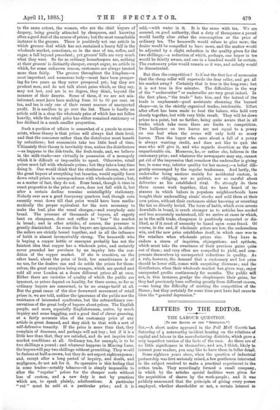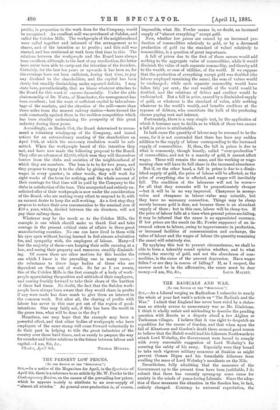LETTERS TO THE EDITOR.
THE LABOUR QUESTION.
[To THY EDITOR OF THE sszcwaos."1 Six,—A short notice appeared in the Pall Mall Gazette last Saturday of g, noteworthy incident bearing on the relations of capital and labour in the manufacturing districts, which gave a very imperfect version of the facts of the case. As these are of no little significance in themselves, and are, I think, likely to interest your readers, you may like to have them in fuller Some eighteen years since, when the question of industrial partnership was first seriously raised, a few gentlemen interested in the subject resolved to make a practical experiment in the cotton trade. They accordingly formed a small company, in which by the articles special facilities were given for the acquisition of shares by the work.people ; and it was publicly announced that the principle of giving every person employed, whether shareholder or not, a certain interest in
profits, in proportion to the work clone for the Company, would be recognised. An excellent mill was purchased at Sabden, and called the Cobden Mills. The workpeople of the neighbourhood were called together and informed of the arrangement as to shares, and of the intention as to profits ; and this mill was started, and has continued at work from that time to this. The relations between the workpeople and the Board have always been excellent, although, to the best of my recollection, the latter have never been able to carry-out the intention of the founders.
Certainly, for the last ten years or upwards it has been so, for the earnings have not been sufficient, during that time, to pay any dividend to the shareholders, and the capital has been slowly but steadily diminishing under repeated deficits. I may state here, parenthetically, that no blame whatever attaches to the Board for this want of success financially. Under the able chairmanship of Dr. Watts, of Manchester, the management has been excellent ; but the want of sufficient capital to take advan tage of the markets, and the situation of the mill—more than three miles from the nearest railway station—have turned the scale constantly against them in the reckless competition which has been steadily undermining the prosperity of this great industry during these years.
Accordingly, on March 31st, the Board determined to recommend a voluntary winding-up of the Company, and issued notices for an extraordinary meeting of the shareholders on April 10th, at which the necessary resolution would be submitted. When the workpeople heard of this intention they met, and have now made the following proposal to the Board. They offer an advance of £2,000, which sum they will themselves borrow from the clubs and societies of the neighbourhood of which they are members. The loan is to be for two years, and they propose to repay it to the clubs by giving-up a full week's wages in every quarter ; in other words, they will work for eight weeks of the term for nothing, and the whole amount of their earnings for that time will be paid by the Company to the clubs in satisfaction of the loan. This unexpected and entirely unsolicited offer of their workpeople is now under the consideration of the Board, who are making every effort to respond to it, with an earnest desire to keep the mill working. As a first step they propose to reduce their own remuneration to the nominal sum of £50 a year, which, divided between the six directors, will not pay their railway-fares.
Whatever may be the result as to the Cobden Mills, the example is one which should make us thank God and take courage in the present critical state of affairs in these great manufacturing counties. No one can have lived in them with his eyes open without having learned to feel sincere admiration for, and sympathy with, the employers of labour. Many—I fear the majority of them—are keeping their mills running at a loss, and seeing their property and resources steadily diminishing. Of course there are other motives for this besides the one which I know is the prevailing one in many cases,— the reluctance to throw large bodies of those who are dependent on them out of work. So far as I am aware, this of the Cobden Mills is the first example of a body of workpeople appreciating the position and attitude of their employers, and coming frankly forward to take their share of the burthen of these bad times. No doubt, the fact that the Sabden workpeople have always been aware that they would share in profits if any were made has done much to give them an interest in the common work. But after all, the sharing of profits with labour has never in this case got out of the region of goodintentions. One may fairly ask, if this has been the result in the green tree, what will be done in the dry ?
Meantime, one may hope that the example may have a powerful effect, and that other bodies of workpeople who have employers of the same stamp will come forward voluntarily to do their part in helping to tide the great industries of the country over these hard times, and so surely to prepare the way for sounder and better relations in the future between labour and capital.—I am, Sir, &c.,
Chester, April 8th. THOMAS HUGHES.



































 Previous page
Previous page